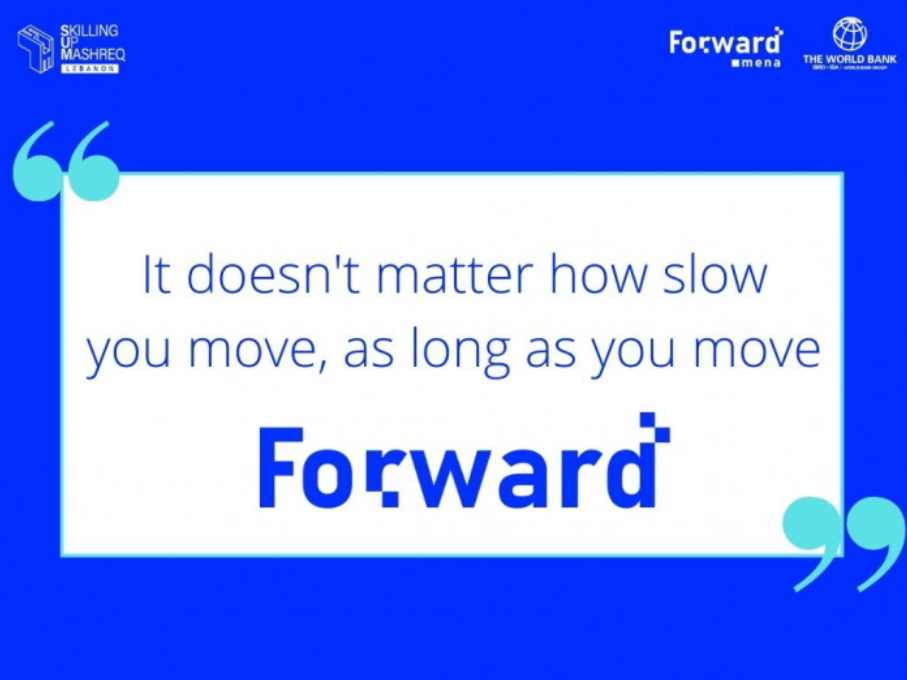As the world moves at a rapid pace towards digitalization, the gap between the skillsets of today’s talent and requirements of the workplace is exponentially growing. Accordingly, academic institutions and organizations have taken on the role of filling this gap. One such non-governmental organization is Forward MENA (previously known as the BDD Academy), committed to developing the skill sets of people from all backgrounds to fulfill the digital jobs of today and tomorrow.
As part of its scope, Forward MENA supports the new generation of educational programs in testing and developing their curriculum, sourcing participants and scaling. It serves as an incubator of educational programs at the intersection of design, technology, and leadership targeting kids, university students and continuous learners. Some partners include the World Bank, UNICEF, Beirut Digital District, AUF, Code.org, The Makers Hub, Microsoft, Nooreed, E-Flow, Tabshoura, to name but a few.
BDD’s team sat with Dania Jarmakani (DJ), Communications Coordinator at Forward MENA to discuss the support needed for new generations of talent, as well as the various programs currently underway.
BDD: What are the key achievements of Forward MENA to date?
DJ: Forward MENA is rapidly growing. We have had many projects under the name of BDD Academy, until we recently rebranded and are now known as Forward MENA. Ever since 2018, we have been working on several initiatives including:
- The Microsoft Certification Project, in collaboration with the World Bank, where we delivered training in software development, IT and Data Analysis. 2,868 qualified candidates joined the program, with 170 students receiving the Microsoft certificates. Out of this, 35% of the youth who received certificates landed jobs within 2 months.
- In partnership with Code.org, the global nonprofit organization dedicated to expanding access to computer science to the youth, Forward MENA offered coding courses online for free, for children ages 6 to 18 across Lebanon, in English, French and Arabic. More than 900 children learnt how to code through basic games offered for free, from the comfort of their homes.
- STEAM summer camps programs, which included training the youth in problem-solving, coding, creativity, engineering, technical skills and design thinking.
These small initiatives led to the Skilling Up Lebanon (SUL) Project, which is a one-year project, funded by the World Bank, aiming to support the promotion of digital skills. The project aims to equip the young people with market-relevant digital skills to enhance their chances of becoming employed.
Under the SUL, we have inaugurated the Career Guidance Program, in partnership with the Nooreed organization. The program aims to raise awareness to high school students about the various opportunities in the market, specifically in light of the changing nature of jobs recruiting from technology.
So far, we have visited 21 public and private schools in Lebanon, offering career guidance, a personality test, and much more. More than 1000 students have so far benefited from our program.
Under the SUL project, we also inaugurated the Takkaddom Internship Program. To date, at least 100 interns are now working for different companies all over Lebanon, and we aspire to hire more and keep growing this program.
BDD: Can you tell us more about the Takkaddom Internship Program?
DJ: The Takkaddom Internship Program was launched to expose university students to opportunities in the digital and creative sector, as well as the start-up and entrepreneurship ecosystem. It also provides digital and creative companies access to brilliant talents, thus bridging the gap between the youth and companies.
We serve as the mediators between the youth and the companies they aspire to work with, sourcing the student talent, matching them with companies, and developing their soft skills along the way.
BDD: What are your contributions in the digital economy?
DJ: Currently, we have just launched the PROSPECTS project in partnership with UNICEF and the World Bank. This project will bring together the public and private sectors, key digital technology players, educational institutions, and vulnerable young people. The aim is to develop a more equitable, systematic, and empowering bridge from skills training to employment opportunities in the digital economy while enhancing the labor intermediation between supply, demand, educational providers and policy-makers.
BDD: Do you have any pilot programs in the pipeline?
DJ: We are currently working on three training programs, which fall under the umbrella of the SUL project. Each program addresses one particular skill and these will be DevOps, Digital marketing and UI/UX. These skills were selected based on a market digest study with local companies in order to understand the needs of the market.
The youth selected will undergo a 3-month training program on the above subjects, in order to enhance their chances of being employed.
For youth to register their interest, visit https://forwardmena.org and register for our youth programs.
BDD: So the question remains, what skills do the youth need to thrive in the workforce of today and the future?
DJ: Based on discussions with key employers in Lebanon, softs skills are integral. We strongly recommend the youth to take part in soft skills training, as this is what will differentiate one candidate from another. In addition, there are various digital and technical skills related to different fields that they can explore from a young age, to be better equipped for the job market.
BDD: What is your hope for the future generations?
DJ: Through our work, we aspire to help pave the career path of the youth of today, to prepare them for the jobs they will encounter in the future.
For more information, please visit https://forwardmena.org
Or connect with the team on




